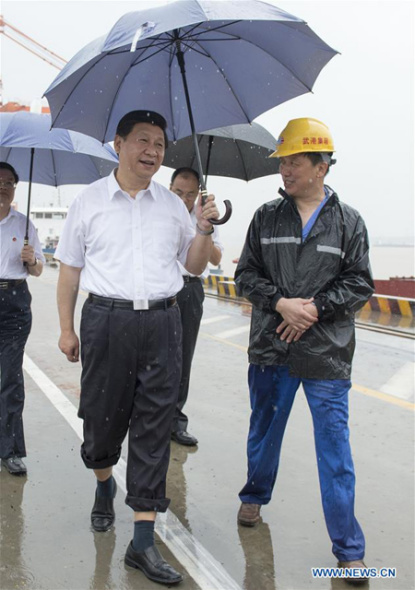
Xi Jinping inspects the Yangluo container port in Wuhan, capital of central China's Hubei Province, July 21, 2013. (Xinhua/Li Xueren)
STRATEGIST BEHIND CHINA'S REFORM
To push forward China's modernization in the 21st century, Xi has launched the world's largest-scale set of reforms.
About three weeks after assuming his post of CPC chief in 2012, Xi trod the same route that Deng Xiaoping took in 1992, to south China's Guangdong Province, the frontline of reform more than 30 years ago.
There, Xi declared, "reform and opening up decide China's fate."
Being the top decision-maker now is no less challenging than it was in 1978. What remain after decades of economic miracles are the most obstinate barriers, such as outdated mentality, deeply-embedded institutional flaws and strong vested interests.
Many who questioned the country's future cobbled together a series of scenarios on China's outlook, ranging from an economic hard-landing to total collapse.
Xi was keenly aware of his responsibility.
"I have been anxious day and night for fear of failing the trust since being assigned the great task," said Xi shortly after taking office, quoting Zhuge Liang, a politician around 1,800 years ago, known for his strategic thinking and diligence.
Xi made his top-level design and strategic arrangements through the "five-sphere integrated plan" -- promoting coordinated economic, political, cultural, social and ecological advancement -- and the "four-pronged comprehensive strategy" -- making comprehensive moves to finish building a moderately prosperous society in all respects, deepen reform, advance law-based governance and strengthen Party governance.
He defined the current phase of China's economic development as "the new normal," which called for new solutions to growth, structure and a new driving force for the economy.
From April 2013, he led a team of officials on producing a key report for the third plenary session of the 18th CPC Central Committee, a document on deepening overall reform.
"We received more than 10,000 proposals from various departments and local governments. The difficulty was to prioritize them," recalled Zheng Xinli, former deputy director of the CPC Central Committee Policy Research Office. "It was Xi who made the final decision to focus on institutional weakness, the problems that triggered serious social conflict and those that the public most strongly petitioned against."
It was also Xi who made the final call about one of the major breakthroughs in the draft -- the report rephrased the market's role in allocating resources, from "a basic role" that had been reiterated by Party documents since 1992, to "a decisive role," a great leap in the relationship between the market and government.
Whereafter, a string of reform projects were undertaken, touching on the most difficult and tangled areas, from state-owned enterprises, household registration, fiscal management and rural land to public hospitals.
Some of these programs used to be considered so sensitive as to be almost impossible.
The 2013 comprehensive reform plan included a policy change about residences provided for senior officials. For years they had been given permanent housing that they and their families could occupy even after retirement. Only accommodating incumbent officials had been discussed but not adopted until Xi's term.
Xi was called "our group leader" by the People's Daily, the CPC flagship newspaper, because, during the past five years, he has headed any number of leading groups covering key areas from overall reform, cyber security, military reform to finance and economic affairs. Xi also announced that the CPC would set up a central leading group for advancing law-based governance in all areas.
Xi was personally involved in the work of these groups, reviewing every draft of major policy sentence by sentence.
Sources close to him told Xinhua that all reports submitted to him, no matter how late in the evening, were returned with instructions the following morning.
Under Xi's leadership, a new-type modern economic system is taking shape in China, featuring large-scale supply-side structural reform, innovation, rural revitalization, coordinated regional development, the socialist market economy and new pattern of overall opening-up.
To help officials fully understand the necessity and urgency of supply-side structural reform, Xi told them stories of Chinese tourists traveling abroad to buy foreign-brand rice cookers and electronic toilet seats.
Xi's vision was embodied in the overall goal of deepening reform -- improving and developing the system of socialism with Chinese characteristics and modernizing the country's governance system and capacity.
Making institutional system more comprehensive, stable and effective was hailed as "the fifth modernization," an addition to the popular catchphrase of "four modernizations" -- agriculture, industry, defense and science -- first raised by the Party in the 1960s.
From law-based governance, environmental friendliness, core socialist values to cultural confidence, more components were added to China's grand modernization design.
Xi's vision of "a great modern socialist country," which aims for socialism's triumph over capitalism, not only guides China to avoiding the middle income trap but is a reference for the governance of other socialist countries.


















































